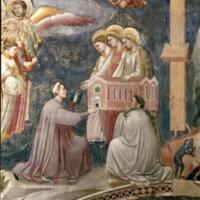Browse Exhibits (1 total)
Papal Corruption in Medieval Italy Through Dante's Divine Comedy (Theodoric Greenleaf)

Papal Corruption in the Time of Dante
For as long as there have been positions of power, there have been those who seek to abuse that power. Thankfully, as long as there has been corruption, there has also been those who seek to reveal and criticize that corruption that they might affect change. Perhaps the most influential, or, at the very least, well-known, critic of corruption in the Christian church is Dante Alighieri (1265-1321), who experienced a great deal of political upheaval and accompanying religious turmoil due to his participation in the Guelph-Ghibelline conflict, and later, the White-Black split of the Guelph party. When Dante wrote his book posthumously titled The Divine Comedy during his permanent exile from Florence, he included a variety of church officials, as well as people he knew either personally or of by way of his Florentine roots, and criticized them heavily for their misdeeds, often placing them in one of the circles of Hell. Examination of this medieval work and the figures within not only reveals the prevalence of moral corruption in the church for the purpose of financial gain despite the highly religious culture of medieval Italy, but also, through the re-interpretation of its passages, allows for the demonstration of the continuation of papal corruption due to greed.